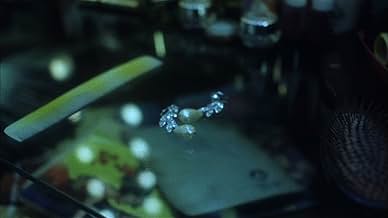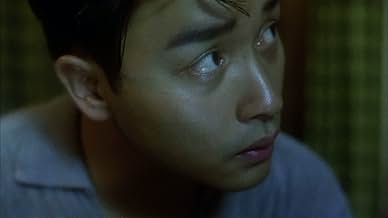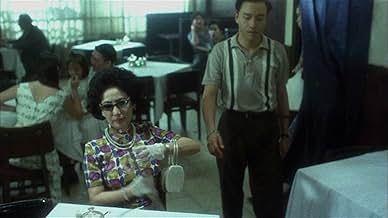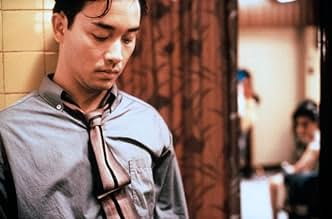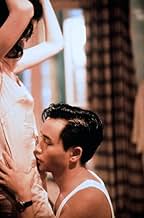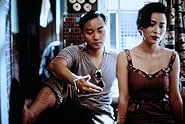NOTE IMDb
7,4/10
27 k
MA NOTE
Un homme essaie de découvrir qui est sa vraie mère après que la femme qui l'a élevé lui raconte la vérité.Un homme essaie de découvrir qui est sa vraie mère après que la femme qui l'a élevé lui raconte la vérité.Un homme essaie de découvrir qui est sa vraie mère après que la femme qui l'a élevé lui raconte la vérité.
- Réalisation
- Scénario
- Casting principal
- Récompenses
- 17 victoires et 9 nominations au total
Rebecca Pan
- Rebecca
- (as Tik-Wa Poon)
Tony Leung Chiu-wai
- Chow Mo-wan
- (as Tony Chiu Wai Leung)
Avis à la une
I guess the main reason that this is my favorite WKW movie is that it's one of the least abstract of his movies and I feel like the viewer becomes more emotionally involved with the characters because of that. The music, as always with WKW, is wonderful and the cinematography is fine, I especially like all the shots of the lush tropical forests. It isn't as beautifully photographed as many of his later films like chungking express and in the mood for love. And it doesn't feature much of the fancy techniques that WKW likes to employ in movies like fallen angels or happy together. Still I think this is my favorite of Wong Kar Wai's movies, not necessarily the best, but the one I enjoy the most. Highly Recommended.
Though it has been argued that 'A Fei Zheng Chuan' (aka 'Days of Being Wild') is the first set of the trilogy which is completed by 'Fa Yeung Nin Wa' (aka 'In the Mood For Love') and '2046', it 'looks' different from the other two films. Kar Wai uses less colour, more shadow, rain and heat and more rawness. The tone is much darker than in 'Fa Yeung Nin Wa' as the film is set in the 50s. The music is beautiful and effectively used. And, here too Kar Wai ends up making a powerful product. Though this film was a box office failure, it is an artistic victory.
'A Fei Zheng Chuan' tells the story of 6 individuals whose lives are interconnected by each character's search and struggle for an identity. It's about loneliness, unrequited love, lost love, the search for love, and how the search continues. Kar Wai clevely brings up the theme of sex (without showing any nudity). The writing is excellent and the characterization is strengthened by superb and unique performances. The late Leslie Cheung's Yuddy is not a very likable person but we do sympathize with this man and recognize him. Maggie Cheung as Su gives one of the most subtle and finest performances. Carina Lau is energetic and terrific as Mimi. Rebecca Pan gracefully downplays her part. Andy Lau's Tide and Jacky Cheung's Zeb too are relatable and the actors are nothing short of remarkable. Actually, I recognize all the characters in this film.
I loved the cinematography, especially the long shots. One of my favorite shot is the introduction of the scene that glides from the Phillipine streets to Yuddy and Tide in a lunch bar. This is one fine example of skillful camera-work. The shaky camera (which thankfully isn't overdone) and the close-ups that mostly take place during conversations and intimate moments between two characters work very well. Doyle's camera-work simply guides us through the lives of these characters.
Summing it up, 'A Fei Zheng Chuan' works on many levels. It is an excellent study of characters, it 'tells' a universal story in a poetic way and it is a fine cinematic experience.
A bird that never lands will one day suddenly seize to exist.
'A Fei Zheng Chuan' tells the story of 6 individuals whose lives are interconnected by each character's search and struggle for an identity. It's about loneliness, unrequited love, lost love, the search for love, and how the search continues. Kar Wai clevely brings up the theme of sex (without showing any nudity). The writing is excellent and the characterization is strengthened by superb and unique performances. The late Leslie Cheung's Yuddy is not a very likable person but we do sympathize with this man and recognize him. Maggie Cheung as Su gives one of the most subtle and finest performances. Carina Lau is energetic and terrific as Mimi. Rebecca Pan gracefully downplays her part. Andy Lau's Tide and Jacky Cheung's Zeb too are relatable and the actors are nothing short of remarkable. Actually, I recognize all the characters in this film.
I loved the cinematography, especially the long shots. One of my favorite shot is the introduction of the scene that glides from the Phillipine streets to Yuddy and Tide in a lunch bar. This is one fine example of skillful camera-work. The shaky camera (which thankfully isn't overdone) and the close-ups that mostly take place during conversations and intimate moments between two characters work very well. Doyle's camera-work simply guides us through the lives of these characters.
Summing it up, 'A Fei Zheng Chuan' works on many levels. It is an excellent study of characters, it 'tells' a universal story in a poetic way and it is a fine cinematic experience.
A bird that never lands will one day suddenly seize to exist.
There is a two-minute action sequence, but that is NOT what this masterpiece is about. 'Days of being wild' has to be the best film of Wong Kar-Wai or at least MY favourite. There are three stories (in one) that feel like film-noir now and then, but are principally about the distance in several different relationships. Kar-Wai lets his characters struggle with urban loneliness and lets them search indefinitely, unable to settle down. They only have the chance to create 'One Minute Friendships' that might seem magic but don't offer satisfaction and have to be ended. The quest continues. Won Kar-Wai poses the question whether you have lived actually when you've searched all your life for friendship/love. Two or three voice-overs scarcely help the portrayal of the characters, but only when the story allows it. I prefer this film over Chungking Express anytime. One reason for that is the great use of music here, while his other films tend to drown in the excessive use of western music. The acting is also really brilliant in this eclectic work.
Subtle and masterly cinematography by Christopher Doyle (Chungking Express, Fallen Angels '95): less colorful than 'In the mood for love', but therefore more applicable for the fifties. Moreover, the dynamics are also much more subtle than everything Kar-Wai and Doyle have done up till now. In contrast: Happy Together and Fallen Angels were brilliantly photographed because there it was more appropriate to use dynamic cinematography (more temperament). It's only Kar-Wai's second film but still his most solid and memorable and maybe even more internationally appealing than 'In the mood for love', without making compromises or getting sentimental. I just can't think of anything that is not good in 'Days of being wild'.
10 points out of 10 :-)
Subtle and masterly cinematography by Christopher Doyle (Chungking Express, Fallen Angels '95): less colorful than 'In the mood for love', but therefore more applicable for the fifties. Moreover, the dynamics are also much more subtle than everything Kar-Wai and Doyle have done up till now. In contrast: Happy Together and Fallen Angels were brilliantly photographed because there it was more appropriate to use dynamic cinematography (more temperament). It's only Kar-Wai's second film but still his most solid and memorable and maybe even more internationally appealing than 'In the mood for love', without making compromises or getting sentimental. I just can't think of anything that is not good in 'Days of being wild'.
10 points out of 10 :-)
In Wong Kar-wai's 1991 film Days of Being Wild, Yuddy (Leslie Cheung), a charming drifter captures the attention of store attendant Su Lizhen (Maggie Cheung) by asking her to look at his watch. When she sees that it says one minute before 3:00PM on April 16, 1960, he tells her that she will never forget the moment and will dream about him that night. The next time they meet, the moment becomes two, then one hour, then weeks and months but Yuddy is like the mythical bird with no legs that just flies and flies and never lands. Abandoned by his real mother and brought up by a wealthy alcoholic courtesan (Rebecca Pan), he does not know where he came from or where he is going. He treats women with little respect, discarding them when they no longer serve his purpose. When one lover asks him if he loves her, he tells her that during his life he will be friends with many, many women but won't know whom he truly loves until the end.
Days of Being Wild unfolds like a dream with color filters, unusual shadows, and the sights and sounds of Hong Kong's rainy nights and sweltering summers. Based on the director's memories from his childhood and admiration for the style of Argentinean novelist Manuel Puig (Heartbreak Tango), the film is a series of episodes involving six people who touch each other's lives. After his short-lived relationship with Su, Yuddy meets a cabaret dancer who calls herself Mimi (Carina Lau) but their relationship fares no better and she is left to suffer the consequences of their breakup. Meanwhile, Su meets Tide (Andy Lau), a gentle policeman whom she is able to confide until he suddenly leaves Hong Kong to become a sailor. Each character seeks a sense of identity and fulfillment. After Rebecca tells him of her plans to move to America with her boyfriend, she finally lets him know who and where his real mother is. After Yuddy goes to the Philippines to try to find his mother, the lives of the main protagonists come together in a powerful conclusion.
Days of Being Wild may sound like a soap opera but the film reaches a much higher artistic level. Supported by outstanding performances by Leslie Cheung, Maggie Cheung, and Jacky Cheung as Yuddy's only friend Zeb, it is a tone poem about longing and one's search for identity. We care about the characters even though they don't seem to care about themselves. Like many of us, they pine for the things that might have been, the word that was never said, and the love that remains elusive. A commercial failure but an artistic triumph, Days of Being Wild is a moody, atmospheric film that with its background of popular music, in this case 1950's rumbas and cha-cha's, forecasts the director's later In the Mood For Love. As a beautifully realized example of alienated people desperately seeking their place in the world, however, it stands securely on its own.
Days of Being Wild unfolds like a dream with color filters, unusual shadows, and the sights and sounds of Hong Kong's rainy nights and sweltering summers. Based on the director's memories from his childhood and admiration for the style of Argentinean novelist Manuel Puig (Heartbreak Tango), the film is a series of episodes involving six people who touch each other's lives. After his short-lived relationship with Su, Yuddy meets a cabaret dancer who calls herself Mimi (Carina Lau) but their relationship fares no better and she is left to suffer the consequences of their breakup. Meanwhile, Su meets Tide (Andy Lau), a gentle policeman whom she is able to confide until he suddenly leaves Hong Kong to become a sailor. Each character seeks a sense of identity and fulfillment. After Rebecca tells him of her plans to move to America with her boyfriend, she finally lets him know who and where his real mother is. After Yuddy goes to the Philippines to try to find his mother, the lives of the main protagonists come together in a powerful conclusion.
Days of Being Wild may sound like a soap opera but the film reaches a much higher artistic level. Supported by outstanding performances by Leslie Cheung, Maggie Cheung, and Jacky Cheung as Yuddy's only friend Zeb, it is a tone poem about longing and one's search for identity. We care about the characters even though they don't seem to care about themselves. Like many of us, they pine for the things that might have been, the word that was never said, and the love that remains elusive. A commercial failure but an artistic triumph, Days of Being Wild is a moody, atmospheric film that with its background of popular music, in this case 1950's rumbas and cha-cha's, forecasts the director's later In the Mood For Love. As a beautifully realized example of alienated people desperately seeking their place in the world, however, it stands securely on its own.
There is an unpolished, raw, kind of grimy feeling to this film, one which maybe fits the sad, lonely little lives of these characters, few of whom are likeable. A young playboy (Leslie Cheung) who "hates work" treats a couple of women like disposable objects, and yet they can't seem to stop loving him. It's a type of story I'm not all that fond of, even if we gradually understand one of the things that seriously damaged him, and maybe made him into the self-centered asshole we see before us. His mother gave him up for adoption, and his stepmother only took him so she could get a regular paycheck. It was quite hard to empathize with him though, and I disliked the misogynistic overtones of the film. Even his nerdy friend gets in on it, slapping his second girlfriend (Carina Lau) around in the rain after she's been abandoned. My favorite moment was when a kind police officer tries to talk some sense into the first girlfriend (Maggie Cheung), and after they part, he narrates:
"I never really thought she'd call. But every time I passed by the phone booth, I'd stand there for a while. Maybe she's all right and she made it back to Macao. Or maybe she just needed someone to help her through that one night. Soon after that, my mother passed away, and I became a sailor."
The film desperately needed more humanizing touches like that, or some level of self-reflection or philosophy deeper than its bird metaphor. The painting of emptiness and loneliness that Wong Kar-wai gives us is undercut without it, though I did like some of the artistry in his camera work. Oh, and if you're as puzzled as I was about the character seen at the very end, it's a somewhat random/minor character who was meant to be the main character of the second part of the story, a film which was never made. Somehow the meaninglessness of that fits, though I'm not sure it's in a good way.
"I never really thought she'd call. But every time I passed by the phone booth, I'd stand there for a while. Maybe she's all right and she made it back to Macao. Or maybe she just needed someone to help her through that one night. Soon after that, my mother passed away, and I became a sailor."
The film desperately needed more humanizing touches like that, or some level of self-reflection or philosophy deeper than its bird metaphor. The painting of emptiness and loneliness that Wong Kar-wai gives us is undercut without it, though I did like some of the artistry in his camera work. Oh, and if you're as puzzled as I was about the character seen at the very end, it's a somewhat random/minor character who was meant to be the main character of the second part of the story, a film which was never made. Somehow the meaninglessness of that fits, though I'm not sure it's in a good way.
Le saviez-vous
- AnecdotesThe film was supposed to be the first part of a project. But due to its relatively poor performance at the box office when it was first released, the producers decided not to finish the second part. The nameless character that appears in the last scene played by Tony Leung Chiu-wai is supposedly the main character in the second part.
- GaffesWhen Tide checks into the hotel, the hotel manageress hands him the key to Room 206. However, in the next scene, Tide uses the key to enter Room 204. This, however, may not be so much a 'goof' as another recurrence of the number '2046' seen so often in Wong Kar-Wai's films.
- Versions alternativesA different 35mm print of the film features an altered prologue sequence and different edits during the final scenes of the film. This version decreases the length of the film from 95 to 94 minutes.
- ConnexionsFeatured in Nian ni ru xi (1997)
- Bandes originalesJungle Drums (Cantonese cover)
Music by Ernesto Lecuona & J. Cacabas
Lyrics by Sharon Chung
Performed by Anita Mui
Meilleurs choix
Connectez-vous pour évaluer et suivre la liste de favoris afin de recevoir des recommandations personnalisées
- How long is Days of Being Wild?Alimenté par Alexa
Détails
Box-office
- Montant brut aux États-Unis et au Canada
- 146 310 $US
- Week-end de sortie aux États-Unis et au Canada
- 18 090 $US
- 21 nov. 2004
- Montant brut mondial
- 3 257 906 $US
- Durée1 heure 35 minutes
- Couleur
- Rapport de forme
- 1.85 : 1
Contribuer à cette page
Suggérer une modification ou ajouter du contenu manquant

Lacune principale
By what name was Nos années sauvages (1990) officially released in Canada in French?
Répondre

